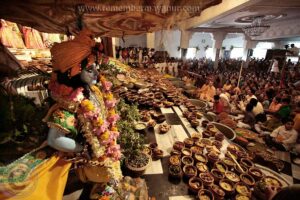SRI ISOPANISHAD THEMATIC STUDY (ACCORDING TO SRILA BHAKTIVINODA THAKURA'S TATTVA-SUTRA), SASTRA CAKSUS YEAR 2, LECTURE #1, 15th Sep 2011
- This study is based on Tattva-sutra of Srila Bhaktivinoda Thakura. In this study, Sri Isopanishad's topics are divided into sambandha, abhideya and prayojana, and that is expanded into 5 topics of Upanishads and into Dasha-mula-tattva.
- The 5 topics of Bhagavad-gita.
- Karma is only there because we think we are the doer.
- Contemplating is mental speculation if it is for our own pleasure; if it is done for Krishna, it is called manana.
- Some devotees consider honoring prasadam sense enjoyment, but actually it is engagement of the senses in the Lord's service. By not believing in using senses for the Lord, the whole culture degrades.
- 5 topics of Upanishads: 1) The nature of Brahman (Ishvara); 2) the nature of the soul and its relation to Brahman (cit); 3) the material energy, its origin and connection to Brahman (acit); 4) the means of attaining Brahman (sadhana); 5) the nature of the supreme goal and status of the jiva in mukti (sadhya). First 3 are sambandha, 4 - abhideya, 5 - prayojana.
- Our acaryas have supported all the Gaudiya Vaishnava conclusions by quotations from Upanishads.
- Caitanya Sikshamrita - all the conclusions of our philosophy based on the Upanishads.
- If a philosophy cannot be taken back to the Upanishads, it is not considered bonafide.
THE NATURE OF BRAHMAN
- Is He saguna or nirguna?
- There is no problem for devotees to discuss Brahman.
- When discussing Krishna consciousness with New Age people, we can use the terms of Sri Isopanishad; nobody has problem with the platform of Brahman. We start with sat, and gradually bring in cit and ananda.
- Dasha-mula explained.
THE NATURE OF JIVA
- Is he one with Brahman or different?
THE MATERIAL ENERGY
- Is it created by Brahman? Is it real or illusory?
- The Lord and His creation are non-different, but at the same time different.
THE MEANS OF ATTAINING BRAHMAN
- Pure devotional service is the living entities occupation and means of attaining Brahman.
THE SUPREME GOAL
- Pure love of Krishna is the living entity's ultimate goal.
- Material means our illusioned concept of the Lord's creation.
- This study will be based on Tattva-sutra.
Part 1 SAMBANDHA
- Invocation, verses 5 and 8.
- Srila Prabhupada has already written an analysis of Bhagavad-gita.
- Tattva-sutra was written for the study of Upanishads. Sri Isopanishad is the main among Upanishads.
- The Lord is omnipotent and omniscient, and all relationships and love are based on Him.
- Whatever we know, God is that plus more.
- Scriptures are generated from the Supreme Lord, so they are only defining what has come from the Lord.
- Upanishads are not dealing with various aspects of the material and how it can be connected to Krishna, other scriptures deal with that. Upanishads only discuss the actual knowledge itself - what is spiritual and what is material.
- Upanishads don't discuss things like health, marriage etc, therefore there are Puranas which explain how people who applied Upanishads lived.
- Para-vidya, apara-vidya and avidya.
- Upanishads only distinguish between vidya and avidya.
- Upanishads and Vedanta are originally meant for sannyasis and brahmacharis. If one can directly engaged in the Lord's service, why would one choose the indirect path?
- Puranic presentation is superior for the devotees, but knowledge-wise Vedanta and Upanishads are superior.
- Due to the imperfections of the material world, there comes a point where the enthusiasm to engage everything indirect in Krishna's service reduces.
- Subject and object in the relationship.
- The subject is interacting with the object, but the interaction is based on the needs of the object.
- The word is pada, the object that the word denotes is padartha. The Lord is quality, and form that manifests that quality is padartha.
- The material world and jiva are expressing the connection to the Lord.
- The Lord is the essence of the padartha, He is different, but at the same time they cannot be separated.
- There is no such thing as material logic; there is only a logical way to express mundane needs. That logic is emotionally connected to one's material attachments.
- In the Vedic system it is common for the author to write a commentary on his own book, and that's very efficient.

